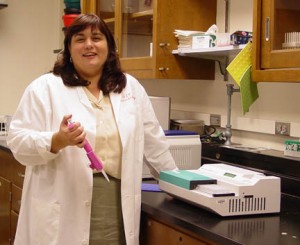By Kate Helm

Professor Lisa Schrott '87 in her lab at Louisiana State University Health Sciences Center
“I have always been curious about how complex behavior emerges from the millions of chemical and electrical releases in the brain,” says Lisa Schrott ’87, associate professor, Department of Pharmacology, Toxicology, and Neuroscience, Louisiana State University Health Sciences Center-Shreveport. “A lot of neuroscience is reductionistic—trying to understand the mechanisms of behavior by taking the brain apart. One of the things that drew me to research was trying to put the pieces back together to understand the whole.”
Schrott focuses her research on the behavioral, endocrine, and immune consequences of prenatal drug exposure as well as the role of neurotrophic factors (relating to the influence of nerves on tissue nutrition) and cytokines (proteins secreted by immune system cells) in brain development and behavior.
As an undergraduate prior to the creation of Lafayette’s neuroscience program, Schrott explored her interests by combining courses and research in psychology with a major in biology. Her work with Christopher Wilson, former professor of psychology, introduced her to the formal discipline of neuroscience and the subfield of developmental psychobiology and led her to graduate school and a career in research.
“I so appreciate Lafayette’s current interdisciplinary focus,” says Schrott, who holds a Ph.D. in developmental psychobiology from University of Connecticut. “I’m envious of Lafayette students who are combining biology and neuroscience with computer science and math, art with music, and political science with philosophy in ways that I never dreamed possible.”
In recent years, Schrott has studied the consequences of prenatal exposure to opioids (chemicals that bind to receptors found principally in the central nervous system and the gastrointestinal tract) in rats. Lately, she has turned her research lens to a potential treatment for the learning and memory deficits brought on by Alzheimer’s disease. Nearly all of her work has potential clinical applications.
“Knowing that the research I do may help alleviate suffering or develop new strategies for treatment is what motivates me,” says Schrott.
For the past eight years, she has mentored students in the Lafayette Alumni Research Network (LEARN) program.
Established in part by a grant from the McCutcheon Foundation, LEARN provides students with an eight- to ten-week paid internship in the neuroscience field. For example, Ashley Juavinett ’11 worked with Schrott on the abuse potential of prescription opioids and then interned the following summer at a county jail to observe the societal effects of addiction. Juavinett is pursuing a doctorate in neuroscience at University of California-San Diego.
“I’ve had the great fortune to mentor outstanding Lafayette neuroscience majors,” says Schrott, noting that they dig right into the research-intensive medical school environment and are prepared not only by their rigorous coursework, but also by “Lafayette’s approach of interdisciplinary scientific inquiry emphasizing process-driven questioning that reflects real-world problems.”
Schrott, who also teaches graduate and medical school students, had her first teaching experience at Lafayette as teaching assistant for the general biology lab, under the supervision of Lorraine Mineo, retired general biology laboratory coordinator and lecturer, and Robert Chase, Charles A. Dana Professor Emeritus of Biology.
“I love when students make a connection between something they’re learning in class and data from an experiment, or integrate material from two classes and see the world in a different way,” she says. “Some of the most exciting conversations I have with students are about the implications of the research we’re conducting.”

1 Comment
Comments are closed.